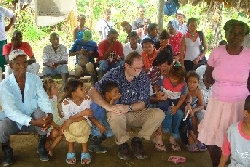
Contact: Juan Michel, World Council of Churches, + 41 22 791 6153, +41 79 507 6363, media@wcc-coe.org
FEATURE, Dec. 22 /Standard Newswire/ -- They are called Pueblo Nuevo (new town), Bella Flor (beautiful flower), Nueva Esperanza (new hope), El Tesoro (the treasure). Names that clearly show what "humanitarian zones" mean to the people who live there. Hundreds of families displaced by violence in
Photo: People living in a Colombian humanitarian zone, please credit: © William Delgado/WCC; high resolution version
In October 1996, eight peasants were killed by paramilitaries in the Brisas de la Virgen community, in Chocó Department, in north-eastern
In February 1997, with the stated goal of annihilating the left-wing rebels, the armed forces launched Operation Genesis. The bombardment lasted for days in the
The families that remained began the long journey that comes with forced displacement. According to Amnesty International, around 6,500 people in 49 communities in the
Enrique Petro and other community leaders were among the survivors. At the beginning of December, they shared their experiences with a Living Letters ecumenical delegation from the World Council of Churches (WCC). The delegation visited them in the Las Camelias humanitarian zone in the River Curvaradó catchment area, where 18 families now live.
"Living Letters" are small teams that work within the framework of the WCC's Decade to Overcome Violence. They travel to different parts of the world where Christians are striving to promote peace in violent situations. Their goal is to express the solidarity of the ecumenical community and learn how people are dealing with the challenges that face them.
The Living Letters delegation that visited
Business is business
The Chocó region is of military importance for all parties to the conflict that has involved the army, two groups of left-wing rebels and right-wing paramilitaries since the 1960s. Close to the border with
The region is also of great economic interest. It is potentially the site of a canal linking the Caribbean and
The area's population, which individually and collectively has legitimate property rights to land whose value has multiplied tenfold since 1996, has become an obstacle in the way of military actors and powerful economic interests.
Today, transnational companies use extensive areas of this territory for African oil palm plantations and for cattle rearing.
"We have seen how economic projects use the armed conflict as a pretext to evict peasants and steal their land", said Rev. Christopher Ferguson, the WCC representative to the United Nations and member of the Living Letters team. "Transnational companies are responsible for the suffering of these communities", he added.
In addition to the Curvaradó region and the cities of Bogotá and
"I was impressed by the way in which the families of the victims have been able to transform their suffering into resistance through the search for truth, justice and reparation", said Bishop Aldo Etchegoyen, of the Evangelical Methodist Church of Argentina and member of the Living Letters team.
Zones of refuge and resistance
Since 1999, some of the displaced people in Curvaradó and neighbouring Jiguamiandó have tried to return to their homes with the support of non-governmental organisations, including the Inter-Church Justice and Peace Commission.
In 2001, a military and paramilitary attack caused new displacements. This exodus coincided with the introduction of African oil palm plantations on the evicted communities' land. Less than a decade later, the tropical forest has become a "green desert" of oil palm trees.
In 2002 and again in 2003, the Inter-American Commission on Human Rights (IACHR) called for the right to life of the members of the Curvaradó and Jiguamiandó communities to be protected.
Starting in 2003, the humanitarian zones of Pueblo Nuevo (90 families), Nueva Esperanza (47 families) and Bella Flor (30 families) were created in Jiguamiandó. Three other zones, including El Tesoro and Las Camelias were created in Curvaradó as of 2006.
The humanitarian zones are clearly demarcated areas inhabited by the civilian population where armed forces of any kind are not supposed to enter. In the zones, groups of families help each other to protect themselves against militarization while at the same time defending their rights. Since March 2005, these zones have the backing of the IACHR, which has required the Colombian government to grant them special protection.
In the light of the continued presence in the region of what the Organization of American States calls "illegal armed structures, linked to illicit economies", one of the responses of churches and ecumenical agencies is to provide the communities with a permanent protective presence.
This is done through volunteers – normally two – who live with the families in the humanitarian zones, Fr Alberto Franco, of the Inter-Church Justice and Peace Commission, explained to the Living Letters delegation.
"Now that we are leaving, we want to tell the whole world about what has happened to these children, elderly people and widows who have told us about their pain and loss", said the Rev Jorge Ziljstra, secretary for the Caribbean and Great Colombia region of the Latin American Council of Churches. "In the midst of uncertainty, fear and threats against their lives, they continue to resist and to fight for justice and dignity."
Additional information on the Living Letters visit to
http://overcomingviolence.org/en/peace-convocation/living-letters-visits/colombia.html
WCC member churches in
Opinions expressed in WCC Features do not necessarily reflect WCC policy. This material may be reprinted freely, providing credit is given to the author.
The World Council of Churches promotes Christian unity in faith, witness and service for a just and peaceful world. An ecumenical fellowship of churches founded in 1948, today the WCC brings together 349 Protestant, Orthodox, Anglican and other churches representing more than 560 million Christians in over 110 countries, and works cooperatively with the Roman Catholic Church. The WCC general secretary is Rev. Dr Samuel Kobia, from the




 Sign Up to Receive Press Releases:
Sign Up to Receive Press Releases: